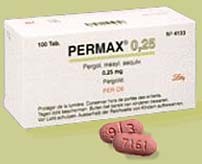
pergolide – oral, Permax
Medication Uses How To Use Side Effects Precautions Drug Interactions Overdose Notes Missed Dose Storage USES: This medication is used to treat Parkinson’s disease. It can improve your ability to move and decrease shakiness (tremor), stiffness, slowed movement, and unsteadiness. It may also decrease the number of episodes of not being able to move ("on-off syndrome").Pergolide is an ergot medication that works by helping to restore the balance of a certain natural substance (dopamine) in the brain.This medication has been withdrawn from the U.S. market due to safety problems (see Side Effects-heart valve problems). Do not stop taking this medication suddenly (see How To Use section). Talk to your doctor or pharmacist about other treatment options (e.g., pramipexole, ropinirole). HOW TO USE: Take this medication by mouth with or without food, usually 3 times a day or as directed by your doctor. Taking this medication with food may reduce nausea. To decrease the risk of side effects (e.g., drowsiness, low blood pressure) when you first start taking pergolide, your doctor will slowly increase your dosage until the best dose for you is reached. Take this medication exactly as prescribed. Do not increase your dose or take it more often than directed.Use this medication regularly in order to get the most benefit from it. To help you remember, take it at the same times each day. If you are taking levodopa or a carbidopa/levodopa combination, your doctor may direct you to decrease your levodopa dose after you start taking pergolide. Follow your doctor’s directions carefully.Do not stop taking this medication without your doctor’s approval. If you suddenly stop taking this drug, withdrawal reactions may occur. Such reactions can include fever, muscle stiffness, confusion, and hallucinations. Report any such reactions to your doctor immediately. When stopping extended, regular treatment with this drug, gradually reducing the dosage as directed will help prevent withdrawal reactions. Consult your doctor or pharmacist for more details.The dosage is based on your medical condition and response to treatment. It may take a few weeks for you to notice the full effects of this medication.Tell your doctor if your symptoms do not improve or if they worsen. SIDE EFFECTS: Nausea, dizziness, drowsiness, trouble sleeping, diarrhea, heartburn, runny nose, constipation, headache, or dry mouth may occur. If any of these effects persist or worsen, tell your doctor or pharmacist promptly.Remember that your doctor has prescribed this medication because he or she has judged that the benefit to you is greater than the risk of side effects. Many people using this medication do not have serious side effects.Tell your doctor immediately if any of these unlikely but serious side effects occur: fainting, mental/mood changes (e.g., confusion, depression, hallucinations, memory problems), increased difficulty moving/walking, muscle cramps/spasm, restlessness, decreased sexual function.Some people taking pergolide have reported falling asleep suddenly during their usual daily activities (e.g., watching television, driving). In some cases, sleep occurred without any feelings of drowsiness beforehand. This sleep effect may occur any time during treatment with pergolide, including up to 1 year after starting the medication. Therefore, you should not drive or take part in other possibly dangerous activities until you are certain that this medication will not cause drowsiness or sudden sleep. If you experience increased sleepiness or fall asleep during the day, do not drive or take part in other possibly dangerous activities until you have discussed this effect with your doctor. Your risk is increased with use of alcohol or other medications that can make you drowsy.You may also develop a sudden drop in blood pressure, which can cause dizziness, nausea, sweating, and fainting. This is more likely when you are first starting the medication, when your dose is increased, or when you get up suddenly. To lower your risk, get up slowly from a sitting or lying position.In rare cases, this medication may cause very serious heart valve problems or swelling around the heart and lungs (e.g., pleural fibrosis/effusion, pericarditis). Tell your doctor immediately if you develop any of the following symptoms: difficult/painful breathing, chest pain, unusually slow/fast/irregular heartbeat, swelling of the ankles/feet, unusual weakness.A very serious allergic reaction to this drug is rare. However, seek immediate medical attention if you notice any symptoms of a serious allergic reaction, including: rash, itching/swelling (especially of the face/tongue/throat), severe dizziness, trouble breathing.This is not a complete list of possible side effects. If you notice other effects not listed above, contact your doctor or pharmacist.In the US -Call your doctor for medical advice about side effects. You may report side effects to FDA at 1-800-FDA-1088.In Canada – Call your doctor for medical advice about side effects. You may report side effects to Health Canada at 1-866-234-2345.
PRECAUTIONS: Before taking pergolide, tell your doctor or pharmacist if you are allergic to it; or to other ergot medications (e.g., bromocriptine); or if you have any other allergies. This product may contain inactive ingredients, which can cause allergic reactions or other problems. Talk to your pharmacist for more details.Before using this medication, tell your doctor or pharmacist your medical history, especially of: low blood pressure, heart problems (e.g., fast/ irregular heartbeat, heart failure, heart valve problems), kidney problems, lung problems (e.g., pulmonary fibrosis), mental/mood disorders (e.g., confusion, hallucinations, psychosis, schizophrenia), sleep disorder (e.g., sleep apnea, narcolepsy).This drug may make you dizzy or drowsy. Do not drive, use machinery, or do any activity that requires alertness until you are sure you can perform such activities safely. Avoid alcoholic beverages.To reduce dizziness and lightheadedness, get up slowly when rising from a sitting or lying position.Kidney function declines as you grow older. This medication is removed by the kidneys. Therefore, elderly people may be at greater risk for side effects such as dizziness and hallucinations.During pregnancy, this medication should be used only when clearly needed. Discuss the risks and benefits with your doctor.It is not known whether this drug passes into breast milk. It may affect milk production. Therefore, breast-feeding is not recommended while using this drug. Consult your doctor before breast-feeding. DRUG INTERACTIONS: Your doctor or pharmacist may already be aware of any possible drug interactions and may be monitoring you for them. Do not start, stop, or change the dosage of any medicine before checking with your doctor or pharmacist first.This drug should not be used with the following medications because very serious interactions may occur: ergot alkaloids (e.g., ergonovine).If you are currently using any of these medications listed above, tell your doctor or pharmacist before starting pergolide.Before using this medication, tell your doctor or pharmacist of all prescription and nonprescription/herbal products you may use, especially of: antipsychotic medication (e.g., haloperidol, pimozide, thiothixene), metoclopramide.Tell your doctor or pharmacist if you also take drugs that cause drowsiness such as: certain antihistamines (e.g., diphenhydramine), anti-seizure drugs (e.g., phenytoin), medicine for sleep or anxiety (e.g., alprazolam, diazepam, zolpidem), muscle relaxants, narcotic pain relievers (e.g., codeine), psychiatric medicines (e.g., chlorpromazine, risperidone, nortriptyline, trazodone).Check the labels on all your medicines (e.g., cough-and-cold products) because they may contain ingredients that cause drowsiness. Ask your pharmacist about using those products safely.This document does not contain all possible interactions. Therefore, before using this product, tell your doctor or pharmacist of all the products you use. Keep a list of all your medications with you, and share the list with your doctor and pharmacist.
QUESTION
OVERDOSE: If overdose is suspected, contact your local poison control center or emergency room immediately. US residents can call the US National Poison Hotline at 1-800-222-1222. Canada residents can call a provincial poison control center. NOTES: Do not share this medication with others.Laboratory and/or medical tests (e.g., blood pressure, radiographic studies, kidney function tests) should be performed periodically to monitor your progress or check for side effects. Consult your doctor for more details.People with Parkinson’s disease may have an increased risk for developing skin cancer (melanoma). Tell your doctor promptly if you notice a change in the appearance or size of moles or other unusual skin changes. Ask your doctor if you should have regular skin exams. MISSED DOSE: If you miss a dose, take it as soon as you remember. If it is near the time of the next dose, skip the missed dose and resume your usual dosing schedule. Do not double the dose to catch up. STORAGE: Store at room temperature at 77 degrees F (25 degrees C) away from light and moisture. Brief storage between 59 and 86 degrees F (15 and 30 degrees C) is permitted. Do not store in the bathroom. Keep all medicines away from children and pets.Do not flush medications down the toilet or pour them into a drain unless instructed to do so. Properly discard this product when it is expired or no longer needed. Consult your pharmacist or local waste disposal company for more details about how to safely discard your product.


